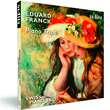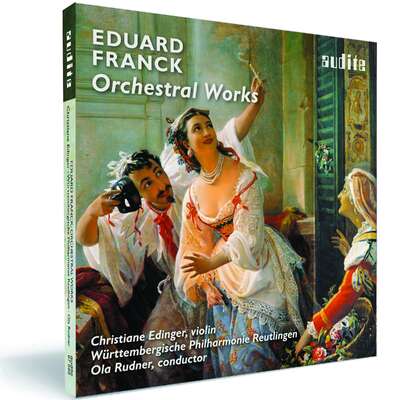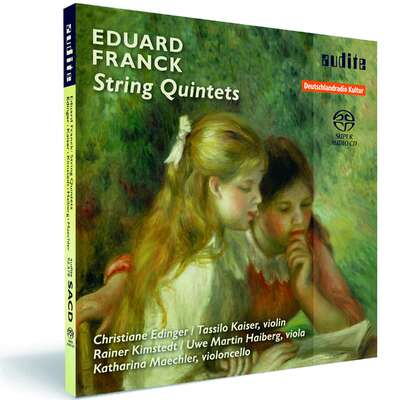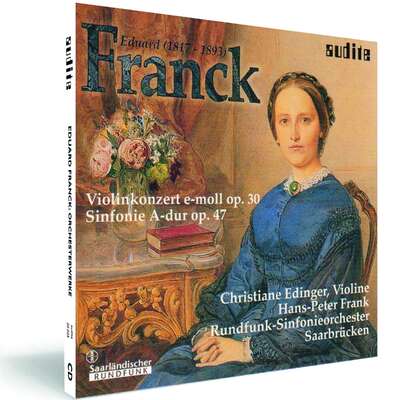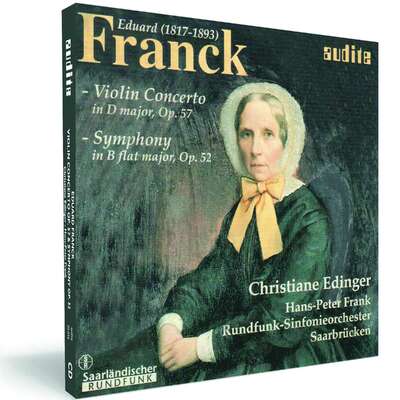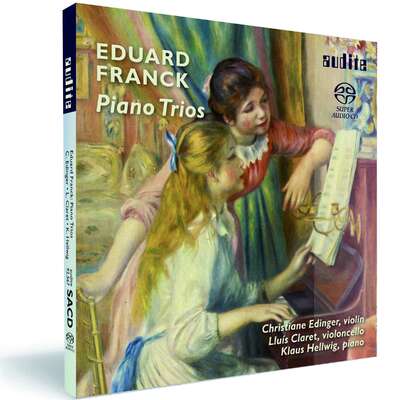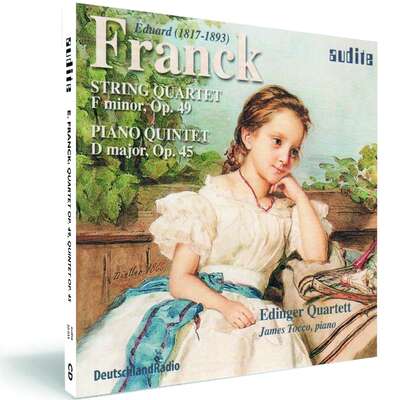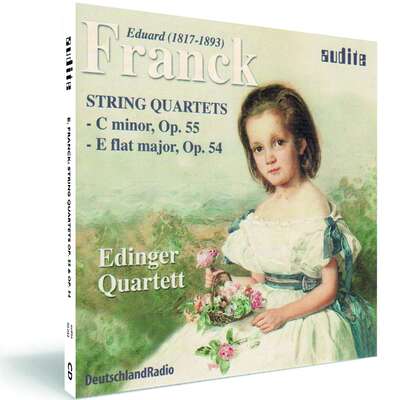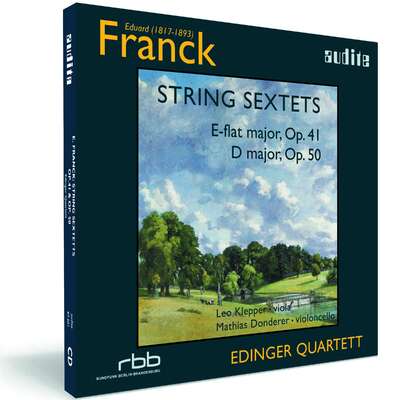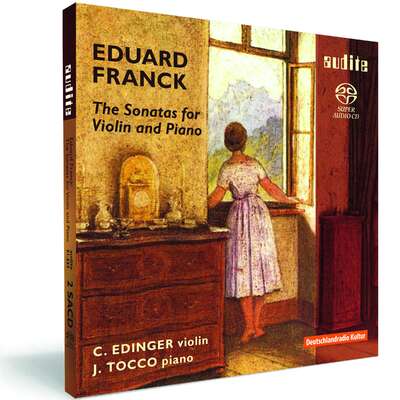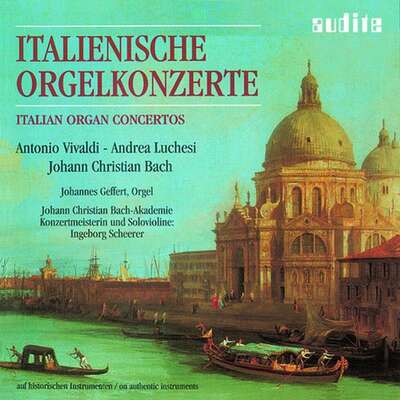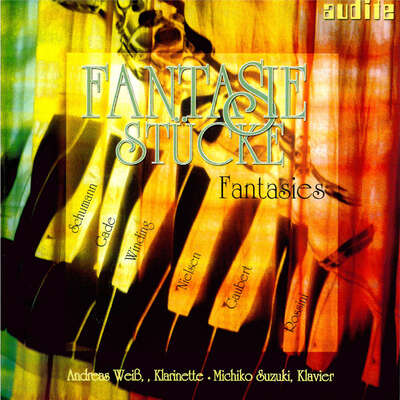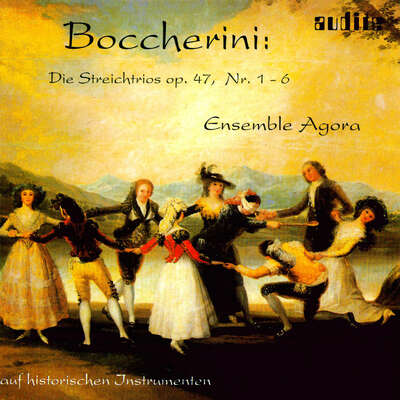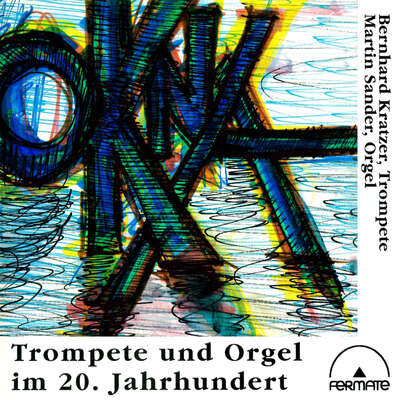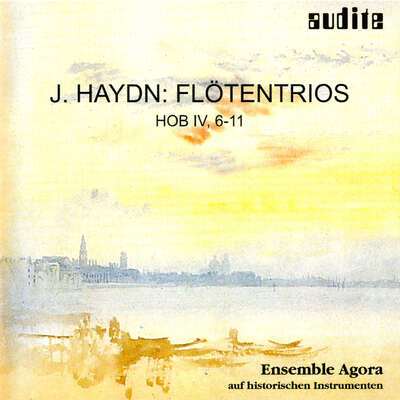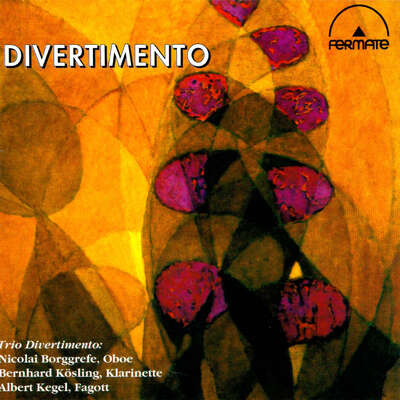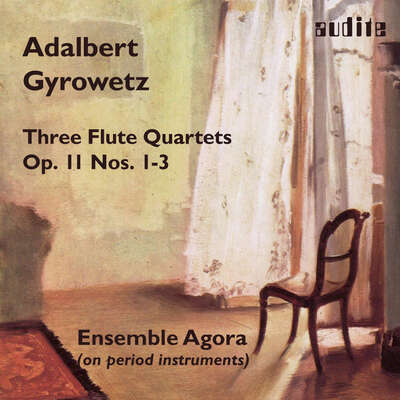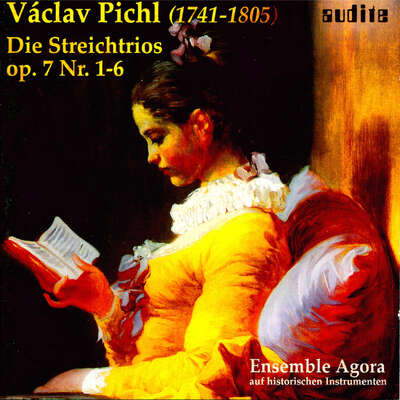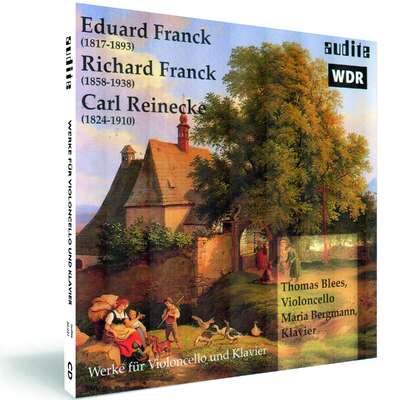
audite’s Eduard Franck series continues with three further chamber works of the composer. This recording of the Piano Trio in E major and the Piano Trios Op. 22 and Op. 53 now completes Franck’s contributions to the genre; both the Trio in E major and Op. 53 are première recordings. Written between 1835 and 1886, these three works span nearly the entire composing career of Eduard Franck and provide valuable insights into the vibrant chamber music culture of the nineteenth century.more
"Das Schweizer Klaviertrio bleibt sich auch bei dieser Einspielung treu und besticht durch Frische, Klarheit, Durchlässigkeit und kraftvolle Brillanz. Und präsentiert sehr lohnende romantische Entdeckungen." (Thurgauer Zeitung)
Details
| Eduard Franck: Piano Trios II | |
| article number: | 97.690 |
|---|---|
| EAN barcode: | 4022143976901 |
| price group: | BCA |
| release date: | 21. February 2014 |
| total time: | 74 min. |
Bonus Material
-
PDSK-Longlist 2_2014
German Record Critic's Award: Nomination for toplist 2/2014
Informationen
audite's Eduard Franck series continues with three further chamber works of the composer. A celebrated pianist who, aged only sixteen, accompanied the violin playing of his musical mentor, Felix Mendelssohn, Franck will doubtlessly have had a special affinity to the genre of the piano trio. This recording of the Trio in E major and the Trios Op. 22 and Op. 53 now completes Franck's contributions to the genre; both the Trio in E major and Op. 53 are première recordings. These works span nearly the entire composing career of Eduard Franck: the E major Trio, written in 1835 when the composer was seventeen years old, was both dedicated to, and a birthday present for, his mother. Op. 22 was composed in the 1850s, during Franck's most successful period, and is the work of an artist who was highly respected in German music circles of the mid-nineteenth century. Op. 53, completed in 1886, is one of Franck's final works, providing insights into the late oeuvre of a composer who was always committed to tradition and who must be considered as an important representative of nineteenth century music culture. Award-winning audite artists, the acclaimed Swiss Piano Trio complete this segment of the Eduard Franck recording series.
Reviews
www.amazon.de | 5. April 2017 | April 5, 2017 | source: https://www.amaz... Great New Swiss Players
This is a rare recording of the German Frank by a superb Swiss Trio. I have never heard these trios before and recommend them as delightful to hearMehr lesen
Image Hifi | I/2015 | Heinz Gelking | January 1, 2015 Früchte der Arbeit
Das Schweizer Klaviertrio hat jetzt drei davon auf hohem Niveau eingespielt. Streicher und Klavier stehen in schöner Balance, das Musizieren hat Energie, Transparenz und Homogenität – hörenswerte Werke in einer Top-Erstaufnahme.Mehr lesen
Muzyka21 | listopad 2014 | Stanisław Lubliński | November 1, 2014
Wydawnictwo Audite kontynuuje serie płytową poświeconą niemieckiemuMehr lesen
Neue Musikzeitung | 9/14 September 2014 | September 1, 2014
Romantische Grenzgänge zwischen Konzert und Salon
Übersehene Kleinode der Klaviertrioliteratur in neuen Aufnahmen
Die CD mit dem Schweizer Klaviertrio ergänzt die verdienstvolle Franck-Serie bei audite um eine weitere Facette – und dies auf vorbildlichem instrumentalen und klangtechnischen Niveau.Mehr lesen
American Record Guide | September 2014 | Gil French | September 1, 2014
Audite is doing a great service by bringing us another album (the 10th) devoted to the music of little-known German composer Eduard FranckMehr lesen
These three works cover most of Franck’s life as a composer. True, the early work is not profound and sounds more like early Mendelssohn (his teacher), yet it’s very satisfying musically. Even at the age of 18, Franck really had a feel for making each of the instruments interesting as they intertwine.
While Franck’s writing is certainly more mature in the two later trios, his overall style did not change much in 51 years. While he writes splendid sonata-allegro movements, his development sections are less contrapuntal than imitative, each instrument repeating or modulating what another has just played. Perhaps this is one reason why his music is not convoluted like Brahms’s can be; Franck’s textures are always transparent, which is such a delight because my ears were consistently tuned to each instrument. No one plays mere filler for more than four measures; I was constantly held in a state of anticipation.
Also, all three works are in major keys, another reason this music is so consistently sunny. In Opus 22 the Scherzo is as inventive and fresh as Schubert or Mendelssohn at their best, especially given the bright, light, upbeat, and uplifted phrasing of violinist Angela Golubeva, cellist Sebastien Singer, and pianist Martin Lucas Staub. They also make the Andante con Moto most soulful and the final Allegro Molto Vivace absolutely foot-tapping. All of these qualities are typical of their playing in all three works.
In Opus 53, as in the others, the players’ wonderful grasp of form translates into joyous forward motion that can still linger at certain points without impeding the progress. They also give full voice to Franck’s splendid gift for melody and lyricism. Also, they adapt their style to each movement: the waltz-scherzo-like II, the tender Andante, and the fleet final Allegro con Fuoco. In all works, I must admit that, while I’m normally critical of players who have little tone color, it’s a “failure” I forgive here because of their extremely wide palette of expression, especially their manner of shaping phrases.
The only other limitation here is the engineering. Balances are superb, including the piano’s full range from firm bass to treble. But the ambience is what happens all too often when ensembles like this are recorded in a church (Temple du Bas in Neuchatel, Switzerland). A kind of hollow aura results, leaving the players somewhat distant. I wish they sounded a degree more present so that the violin wasn’t so consistently thin and the ensemble as a whole without a rich dramatic depth. Franck’s music has it, and I’m sure the players themselves do. I love the album; I just wish that the full experience weren’t locked behind a pastel curtain.
Musik & Theater | 9/10-2014 | Sibylle Schäfer | September 1, 2014 Statt Pralinen
Diese herrlichen Klaviertrios werden in jeder CD-Sammlung brillieren, denn es handelt sich hier durchwegs um meisterhaft gearbeitete Kompositionen, die vor Ideenreichtum und Melodienseligkeit nur so überquellen. Vor allem Opus 22 – das einzige Trio, das zu Lebzeiten des Komponisten gedruckt wurde – braucht den Vergleich mit den besten Werken der Gattung nicht zu scheuen. Man verzeiht es den Interpreten gern, dass sie die Trios auf eine Weise spielen, die niemandem weh tut.Mehr lesen
Fanfare | 19.08.2014 | Jerry Dubins | August 19, 2014
By now, readers should be somewhat familiar with Eduard Franck (1817–1893), following half-a-dozen or so appearances he has made here on recordingsMehr lesen
This latest release, containing three of Eduard’s piano trios, holds no surprises if you’ve already acquainted yourself with one or another previous Eduard Franck release, but like those that have preceded it, this disc of piano trios does hold in store just as many musical felicities.
I use the word “felicity” with intent; for Eduard studied privately with the “Felix” of Mendelssohn fame, and mostly Mendelssohn is what you get with these three trios. It’s really hard to describe how brimming over this music is with sheer contentment in untroubled, joyful song. The nonstop rippling piano parts are shot through with Mendelssohn’s nimble keyboard work, and even Franck’s melodies are consistently constructed from intervals and phrases that are dead ringers for Mendelssohn’s melodic invention. If you find Felix’s two piano trios irresistible, you will be thrilled to know that Eduard Franck composed at least four piano trios just like them.
In fact, this is Audite’s second volume of Franck’s piano trios. The first (92567), on SACD, contained the trios in E Minor, op. 11, and D Major, op. 58, performed by a different ensemble of players than the Swiss Piano Trio on the current disc, which, for some reason, did not come to me on SACD. Also, be aware that if you purchased the Naxos CD containing Franck’s sonatas for cello and violin, plus the E♭-Major Piano Trio I recommended in 36:5, the trio is duplicated on this Audite disc. No matter, though; it’s worth the one duplication to get the two additional trios included on the present CD.
This is now my third or fourth encounter with the Swiss Piano Trio on record, and each one has elicited from me the highest praise. The ensemble’s recent Audite release on SACD of Clara Schumann’s Piano Trio led me to declare the Swiss Piano Trio one of the top ensembles on today’s stage in 36:6; and in a 35:1 review of Robert Schumann’s piano trios, Steven Ritter declared the Swiss Piano Trio’s Audite SACD an essential recording.
It seems only fitting that the Swiss Piano Trio, having already committed Mendelssohn’s two piano trios to disc on another Audite SACD—to which I gave an urgent recommendation in 34: 6—should now turn its attention to Mendelssohn’s musical Doppelgänger, Eduard Franck. You cannot love 19th-century piano trios in general, and Mendelssohn’s piano trios in particular, and not love these trios by Franck. Considering Franck’s dates, the skewing of his catalog towards chamber works (though he did pen symphonies and orchestral scores), and his strong leaning towards a Mendelssohnian style, he bears comparison, I think, to his very close “French-though-I-prefer-to-be-German” contemporary, Theodor Gouvy (1819–1898).
I just don’t understand why previous Audite releases have been SACDs and this one isn’t. Perhaps there is a parallel SACD version, and I just happened to receive the standard two-channel stereo CD one. Anyway, with the music, performances, and recording being so beguiling, it would be churlish of me to complain. This is a must-buy recommendation.
International Record Review | July / August 2014 | Mark Tanner | July 1, 2014
The piano trio emrged as one o f the more important genres in the nineteenth century, from amidst an ever-complex, ever-volatile, ever-vibrant periodMehr lesen
Aged 17, Eduard Franck (1817-93) was a pupil and disciple of Mendelssohn, and during his three Iessons per week Mendelssohn appears to have given Franck the courage and social mobility to move in circles inhabited by the likes of Hiller, Joachim, Chopin, Brahms and Schumann, though his reputation as pianist would somewhat overshadow his accomplishments as composer, at least for the time being. Interestingly, though Franck apparently never aligned himself with the so-called 'New German' circle, populated conspicuously by Liszt and Wagner, nor did he overtly trumpet the cause of the thoroughly grounded Germanic tradition, it is perhaps due to occupying something of a diplomatic middle ground that he would eventually garner the resources to carve an important niche for himself as a composer.
Besides occupying a stalwart position within a vibrant cultural scene, Franck was able to weave in his considerable expertise as pianist into a handful of superb piano trios, which, according to Sebastian Bolz, author of the detailed notes for this new Swiss Piano Trio recording for Audite, may possibly contain one other in addition to the five already known. These exploit the piano's ability to generate intensiy and drama, while at the same time drawing out plenty of excitement from the violin and cello parts. Bolz suggests that Franck's treatment of these instruments is directly indebted to his formative time under Mendelssohn's wing. (My review of the Swiss Trio in May 2011, also for Audite, was indeed the Mendelssohn Trios, in which I praised some 'fiery and effervescent' playing). Over a period of just over 50 years Franck would pen piano trios of appreciable distinction, and yet two of those featuring on this recording are premieres: the E major of 1835 and the D major, Op. 53, of 1886. This disc, which rounds off the Swiss Piano Trio’s project to record all of the piano trios, also holds the E flat major, Op. 22, of 1859.
What strikes me most about the music overall is its affable buoyancy and willingness to move around freely within the blueprint of four strategically positioned movements. While each work contains a racy finale and a thoughtful Andante, only two have scherzos, the E major exhibiting a youthful exuberance and no-holds-barred approach to the Romantic piano part. The players attack this earliest work with decisive, uncompromising tempos, and the sense of enthusiasm is especially palpable in the concluding Presto, where the tight-knit playing comes across as amply spontaneous and ebullient. In the E flat Piano Trio, the longest and perhaps most intriguing of the three due to its sprawling opening movement, Allegro moderato con espressione, there is playing of especial vibrancy and a thoroughly absorbing communication between the players. Notable too are the cheeky Scherzo to the E major and the doleful, heartfelt Andante to the D major, where each instrument claims its territory in a beautifully empathetic way.
Recorded last year at the Temple du Bas in Switzerland, the sound is as sympathetic to the expressive movements as it is to the faster-moving music, and the one or two quibbles I raised about the balance of instruments in relation to the aforementioned Mendelssohn disc are entirely not the case in this splendidly charismatic SACD. It marks the conclusion of an impressive Eduard Franck celebration consisting of a dozen releases from Audite embracing orchestral works, string sextets, quintets and quartets, as well as music for cello and piano.
Fono Forum | Juli 2014 | C. Vr. | July 1, 2014 Ausdrucksstark
Dass Eduard Franck Unterricht bei Felix Mendelssohn bekommen hat, hört man zumindest dem E-Dur-Klaviertrio von 1835 durchweg an. Da sind perlendeMehr lesen
www.expeditionaudio.com | Jun 24, 2014 | Paul Ballyk | June 24, 2014
The remarkable Swiss Piano Trio performs with the impeccable technique, sensitive musicality and homogeneity of sound and approach that set them among the finest such ensembles performing today.Mehr lesen
Ensemble - Magazin für Kammermusik | 3-2014 (Juni/Juli) | Carsten Dürer | June 1, 2014 Aus Mendelssohns Schatten
Das Schweizer Klaviertrio spielt dieses Werk entsprechend mit Vehemenz, jugendlichem Charme und einer wunderbaren Melodienlust [...] auch mit einer neuen Klanggebung und einer Transparenz, die jedwede Nuance hörbar macht.<br /> [...] Insgesamt ist diese CD ein Erlebnis und das Klaviertrio aus der Schweiz zeigt wieder einmal seine Klasse.Mehr lesen
[...] Insgesamt ist diese CD ein Erlebnis und das Klaviertrio aus der Schweiz zeigt wieder einmal seine Klasse.
www.klavier.de
| 20.05.2014 | Florian Schreiner | May 20, 2014
Quer durchs 19. Jahrhundert
Franck, Eduard: Klaviertrios
Der hohe Wert dieser Franck-Produktion liegt also nicht nur darin, dass die Kenntnis des Klaviertrio-Repertoires im 19. Jahrhundert erweitert wird, sondern dass die Werke als eigenständige Beiträge von großem Reiz sind – und von Schweizer Klaviertrio schlichtweg erstklassig präsentiert werden. Und schließlich lassen weder Beiheft noch klangliche Darstellung Wünsche unerfüllt.Mehr lesen
klassik.com | 20.05.2014 | Florian Schreiner | May 20, 2014 | source: http://magazin.k... Quer durchs 19. Jahrhundert
Der hohe Wert dieser Franck-Produktion liegt also nicht nur darin, dass die Kenntnis des Klaviertrio-Repertoires im 19. Jahrhundert erweitert wird, sondern dass die Werke als eigenständige Beiträge von großem Reiz sind – und von Schweizer Klaviertrio schlichtweg erstklassig präsentiert werden. Und schließlich lassen weder Beiheft noch klangliche Darstellung Wünsche unerfüllt.Mehr lesen
??? | 01.05.2014 | Livio Malpighi | May 1, 2014
EduardF ranck era un compositore di origine tedesca( nato a Breslavia) da non confondere con il più noto César Franck, ottimo compositore belga cheMehr lesen
Il suo continuo ricercare la perfezione formale lo portò alla pubblicazione di poche opera che risultano di livello veramente molto alto dal punto di vista compositivo. In questo disco troviamo tre dei suoi trii: quello in E-major del 1835, quello in Es-Dur Op. 22 e quello in D-major Op. 53(questi ultimdi due qui proposti sono in prima registrazione mondiale). Lo Swiss Trio compost da Angela Golubeva al violino, Sebastien Singer al cello e Martin Lucas Staub al piano eseguono con grande affiatamento e comunione di intenti questo difficile repertorio. Questi trii, indubbiamente figli della scuola di Mendelssohn ma con una vena romantic un poco più spinta, sono certamente di non facile esecuzione. Non parlo solo della tecnica esecutiva ma anche dell'interpretazione che richiede la capacità di dipanare un filo logico musicale con frasi molto lunghe che si susseguono senza interruzioni. Questi trii hanno una notevole somiglianza con le composizioni di Brahms, così come il concetto d'interpretazione musicale potrebbe estendersi ad un altro autore molto interessante come Thuille che con il suo Sestetto per pianoforte e fiati, che per certi versi si può accomunare come stile compositivo a Franck, ha creato un'opera di eccezionale livello dalla difficile interpretazione musicale. La caratteristica di questi trii di Eduard Franck sono la cantabilità e la grande maturità musicale, sono opera veramente belle che poco o nulla hanno da invidiare ai capolavori dei grandi maestri dell'ottocento. L'esecuzione poi dello Swiss Trio è fresca, molto matura, tecnicamente molto efficace, in grado di mettere in mostra un fraseggio classico, trasparente e dal romanticismo evidente ma non strillato. Un gran bel disco!
Registrazione nativa 24/96 fatta con i giusti presupposti sonori. La dinamica è ottima anche se non amplissima. Probabilmente qesto deriva anche dagli interpreti che non arrivano mai al triplo forte né tanto meno al pianissimissimo. L’avessero fatto forse avrebbero meritato il giudizio di eccezionale anche nell'interpretazione. Il palcoscenico sonoro è limpido con la corretta disposizione degli interpreti con violin a sinistra, cello a destra e pianoforte dietro. Gli echi ambientali sono presenti ma in maniera non invasiva: una registrazione quindi né troppo asciutta né troppo riverberante. Il corretto eco permette di sottolineare correttamente la bellezza delle composizioni senza nessun mascheramento. Ottima anche la preservazione dei timbri degli strumenti e dei dettagli che si possono cogliere senza sforzo.
Musica | numero 256 - maggio 2014 | Bernardo Pieri | May 1, 2014
L’esecuzione dello Schweizer Trio è di immacolata chiarezza, adeguata bravura, inappuntabile precisione, completa attendibilità. Nell’attesa non ansiosa che ensembles di più spiccata fantasia interpretativa ci facciano scoprire in Franck anche quello che non c’è.Mehr lesen
Thurgauer Zeitung | 4. April 2014 | Martin Preisser | April 4, 2014 Mendelssohn-Schüler zu entdecken
Das Schweizer Klaviertrio bleibt sich auch bei dieser Einspielung treu und besticht durch Frische, Klarheit, Durchlässigkeit und kraftvolle Brillanz. Und präsentiert sehr lohnende romantische Entdeckungen. Mehr lesen
BBC Music Magazine | March 2014 | JH | March 1, 2014
Father of Richard but no relation to Cesar, Eduard Franck combines the neoclassical enchantment of his teacher Mendelssohn and Schumann's lyricalMehr lesen
Musica | numero 254 - Marzo 2014 | March 1, 2014
Scritti tra il 1835 e il 1886, forniscono un significativo sguardo sulla cultura della musica da camera nell’800.Mehr lesen
www.amazon.co.uk | 19 Feb 2014 | J. A. Peacock | February 19, 2014 Audite's rewarding survey of Eduard Franck's piano trios completed
With this latest release from German label Audite we now have all of Eduard Franck's extant piano trios available on disc and what a rewardingMehr lesen
There are three trios here, all of them more concise than the two already recorded by Audite, and to all intents and purposes they hail from across his career – the earliest in E major (1835) was only recently published for the first time, the second (also in E major) was published in 1859, while the final work in D major is dated 1886 on its manuscript, though the booklet writer warns us that the high opus number (Op.53) was assigned by Franck's son, Richard, after the composer's death and that the trio cannot definitively be confirmed as "a late work" (there is a hiatus of two decades during which Eduard Franck seemingly lost interest in publishing any of his compositions). In a sense none of this is of great import – Franck seemingly found his personal voice early on in his creative career and took no interest in the more radical musical developments of the Romantic period.
Of the works here, only the trio of 1835 could possibly be said to stand out from the remainder of Franck's chamber music stylistically and then only in minor details: the piano part is a dominant presence, as in so much chamber music of the 1820s and 1830s, and the work's relatively small scale (it plays for around 20 minutes in total, half the duration of the trios Audite previously recorded by Franck*) is perhaps a sign of the young composer's inexperience at handling extended musical structures (the booklet surmises that this trio was written as a direct result of the lessons with Mendelssohn that commenced in 1834). In other respects, however, it already foreshadows many of the characteristics of his mature music – his melodic fecundity, such as in the uplifting primary theme of the opening 'Allegro' that plays an important role throughout the movement; his very personal warmth of expression, a marked harmonic bitter-sweet quality that is quite distinct from the respective idioms of Schumann or Mendelssohn, for example, two composers who were surely formative influences on his style; and, of course, the verve and sense of forward momentum he brings to his faster movements – the persistently bubbling piano writing already mentioned contributes much to the graceful flow of the music here and the scherzo is typically vivacious and engaging (and, furthermore, remarkable for the economic use of thematic material in achieving this).
With the remaining two trios we have mature Franck – the slightly more extended opening movements of both trios and the greater emotional range they display are evidence surely of his increased experience and increased confidence in using what seems (on the evidence of his chamber output as a whole) to have been an innate gift for handling sonata form. That of the Op.22 trio is designated 'Allegro moderato con espressione', which accounts for the cantabile quality of the primary theme but he also introduces more animated – more light-hearted, perhaps? – material and it is testament to his talents that he melds these contrasting elements into a convincing whole. The 'Andante con moto' here and the 'Andante' of the D major trio, Op.53, are movements of considerable ardour (the heartfelt writing for the strings, for example, in that of Op.22 or the comparable lyricism in the 'Andante' of Op.53) and poetry – listen to his striking use of the piano's lower registers at the close of the D major's 'Andante' (and one might also draw attention in that respect to the haunting interplay of violin and cello in the trio-section of Op.22's scherzo).
With the E major trio, Op.22, we are in the unusual position of having a comparative recording for a major Eduard Franck work, this having been included on a Naxos disc of 2012 devoted to the composer's music**: I have to say that, much as I enjoyed getting to know the trio for the first time courtesy of the artists on that release – and there is no doubting their musicianship – the Swiss Piano Trio's performance will be the one I return to most often, as they seem to find more of the poetry in Franck's lyrical music without losing any momentum and have a lighter, more effervescent touch in the finale. I also have to say that I am inclined to agree with the reviewer of the Naxos release in that there is a slightly unpleasant, acid tone to Shmuel Ashkenasi's violin in that recording (though I should say that some other reviewers either don't seem to hear it or don't find it a problem).
The sound quality here, as I've come to expect from Audite, is impeccable – warm and natural and beautifully balanced. Combined with the polished and sympathetic musicianship on offer here from the Swiss Piano Trio, this disc is undoubtedly another feather in Audite's cap and yet another valuable addition to both the Eduard Franck discography and to our knowledge of German chamber music during the Romantic period.
Enthusiastically recommended – to confirmed admirers of the composer and general listener alike.
News
Wydawnictwo Audite kontynuuje serie płytową poświeconą niemieckiemu...
Audite is doing a great service by bringing us another album (the 10th) devoted...
By now, readers should be somewhat familiar with Eduard Franck (1817–1893),...
The piano trio emrged as one o f the more important genres in the nineteenth...
This is the second disc from the Audite label of piano trios by the German...
EduardF ranck era un compositore di origine tedesca( nato a Breslavia) da non...
Eduard Franck (1817-1893) godette in vita di una buona fama come compositore e,...
Audite's rewarding survey of Eduard Franck's piano trios completed
La serie che AUDITE dedica ad Eduard Franck prosegue con i Trii per pianoforte e...
Father of Richard but no relation to Cesar, Eduard Franck combines the...
